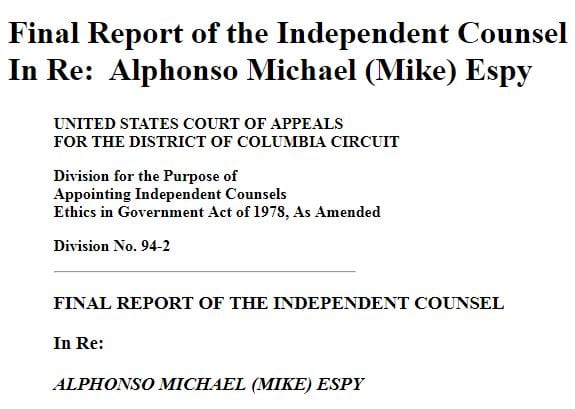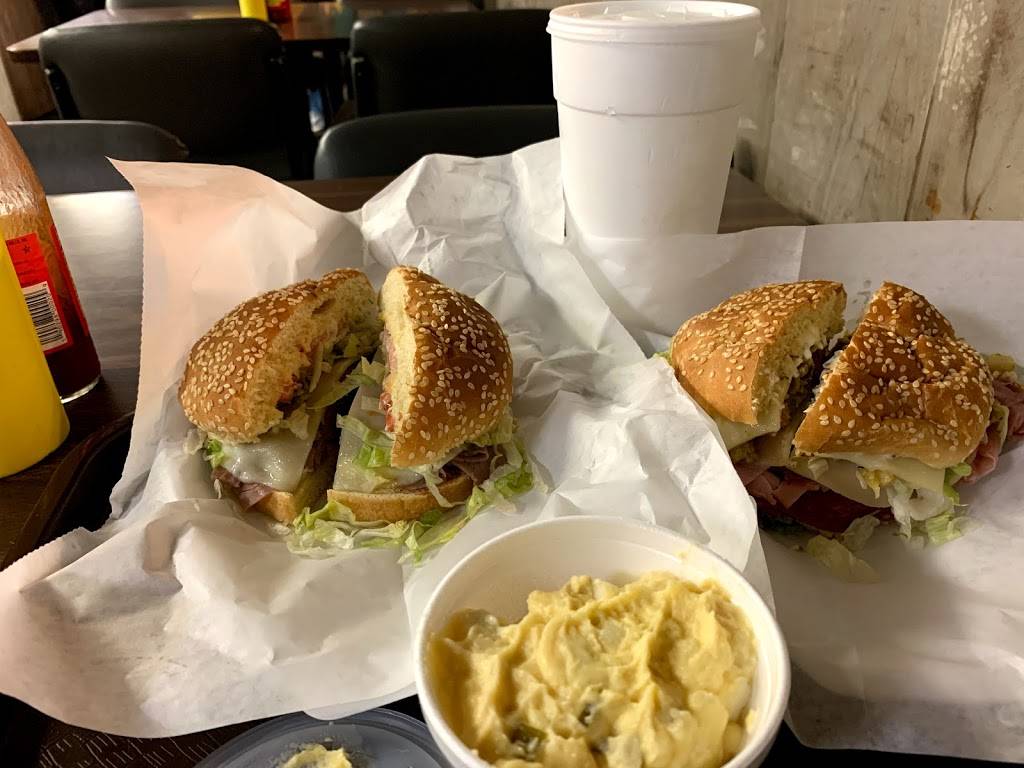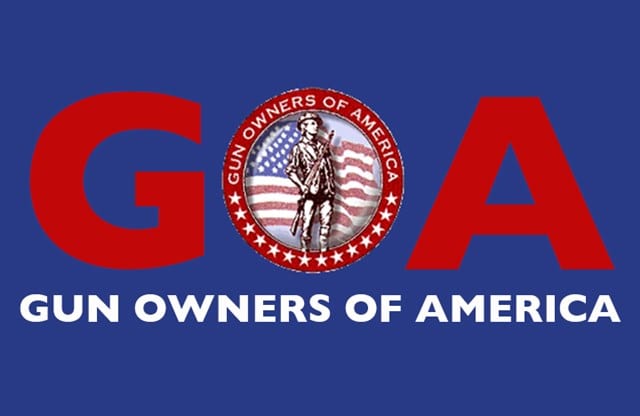
Mississippians most prominently recognize Mike Espy as the first African American Congressman since Reconstruction in the late 1980s. They also remember his service as a Bill Clinton appointee in a relatively short-tenured stint as Secretary of Agriculture.
More recently, they are familiar with his service as a successful trial lawyer and attorney for the Madison County Board of Supervisors. However, during his campaign for US Senate, there’s been literally zero attention given by the Mississippi media establishment on the wide-ranging investigation that led to his downfall as Agriculture Secretary.
A subsequent indictment of Espy ultimately resulted in his acquittal by a Washington DC jury, but there were fifteen other convictions, many of those close to Espy, and $11 million in fines pursuant to the investigation related to gratuities targeted at Espy.

Following the election of Bill Clinton, Espy was unabashed and publicly lobbied for the Agriculture Secretary position. In fact, Espy was so determined to get the job that he actually hand-wrote 10 reasons he should be hired on the back of an envelope and passed it to then President-elect Bill Clinton at a Union Station in D.C.
However, within a year into his tenure, it became clear that there were serious ethical questions that surfaced regarding gifts or “gratuities” including tickets for sporting events, private jet service, jobs and scholarships for his then-girlfriend (he was unmarried at the time), and other perks. His brother Henry Espy subsequently ran for his congressional seat. A complicated scheme orchestrated by those with interests before the Department of Agriculture to help pay off Henry’s campaign debts when he lost, and that resulted in further convictions.
Within two years, Espy was forced to resign from the spot amid allegations of receiving gifts and giving preferential treatment to companies most likely to be impacted by USDA policy. The nexus of Espy’s defense argument was that while he did receive gratuities from entities that clearly had business in front of the USDA, there was no quid pro quo or direct favorable treatment that he initiated in exchange for the gifts.
The most exhaustive fact pattern to the investigation is in the final special counsel report which documents the entire history of the events and all subsequent legal action.
Mike Espy told the Jackson Free Press this week, “Now, if (opponents) want to raise all this again, they can, but I can only say this: It doesn’t matter what they call you; it only matters what you answer to. I answer to exonerated.” But at the time of the scandals, Espy “apologized to [President] Clinton for being ‘careless in managing some of the details of my personal activities.’” Espy said, “I have failed myself.”
Here’s a synopsis of some of the fact patterns in the Espy investigation, broken down by key players and gifts:
The Jeep
Espy was accused of using a USDA-leased Jeep for personal use in Mississippi. According to court documents, from January 1993 to February 1995, Espy wanted to use the Jeep for personal use. The Jeep was leased by the USDA for him because he was Agriculture Secretary. The Jeep was to stay in D.C., however, it was kept in Mississippi for personal use according to the documents. Espy then continued to ask for a limo and driver (which wouldn’t be needed with the Jeep). Those requests were made from April 1993 to December 1994.
Before Espy had spent his first two years in D.C., he had made 20 trips back to Mississippi at government expense.
Patricia Dempsey
Patricia Dempsey, at the time, was Mike Espy’s girlfriend (he was unmarried at the time). Several accusations revolved around Dempsey, including the receipt of a $1,200 scholarship from Tyson foods that was arranged by a lobbyist and for which she did not solicit nor compete.
After a meeting with Oglethorpe Power regarding the Treasury’s rejection of its plan to pay off a loan, Oglethorpe’s consulting firm, EOP Group, hired Dempsey as a training coordinator, “a job that paid $35,000 a year. O’Bannon testified that Dempsey’s performance was “sporadic at best” and said his partners and clients complained about her. She resigned from the firm in March 1995, after Espy had left USDA” but was not a witness in any trials or hearings.
The final report of the Independent Council outlined that International Nut Council also played a part in providing $3,100 to Patricia Dempsey by way of Richard Douglas in May of 1993 for a trip to Greece.
Espy’s trip to Greece was sponsored by the International Nut Council for the Ninth World Nut Congress in Athens. Douglas, according to the indictment, advocated for the council to provide Espy with a $7,000 first-class ticket so Dempsey could also go. “Douglas gave Patricia Dempsey $3,200 in cash so that she could pay for airfare to accompany Espy.”
Sports Perks
The indictment in the Espy case accused the USDA head of soliciting tickets to the June 1993 Chicago Bulls–Phoenix Suns NBA Championship game, a gift which amounted to $90, from the chairman of Quaker Oats.
In January of 1994, Espy received Super Bowl tickets from Smith Barney, an international banking and securities firm. The company later settled the lawsuit against them, though denied the allegations, for $1 million dollars.
Espy also received to the September 1993 U.S. Open tickets and tickets to the November 1993 Washington Bullets–New York Knicks NBA game, both from Sun-Diamond Growers.
Henry Espy
Henry Espy is the brother of Mike Espy. Henry Espy made an unsuccessful Congressional run to fill his brother’s empty seat in 1993. Crop Grower’s Corp paid a fine of $2 million for illegally contributing $46,000 to the campaign.
Henry was charged but acquitted of conspiring to make false statements so that he could extend a loan deadline and cover up illegal contributions. However, the chairman of his campaign, Alvarez Ferrouillet, was found guilty of transporting stolen property across state lines, money laundering, and false statements regarding money contributing to the Congressional campaign of Henry Espy. Ferrouillet was found guilty and sentenced to one year in prison and a $10,000 fine.
Richard Douglas
Espy’s indictments reference Richard Douglas numerous times. Douglas, over the course of the allegations, served as a vice-president and then a lobbyist for Sun-Diamond Growers. Sun-Diamond provided Espy over $20,000 in special treatment, including luggage, limousines, sports tickets, contributions to Espy’s brother Henry’s campaign, and cash to Espy’s girlfriend.
Richard Douglas earned a two-year prison sentence and $250,000 fine in connection to the Espy case.
Ronald Blackley
While Espy was eventually acquitted of all charges, his Chief of Staff, Ronald Blackley, did not enjoy such luck. Blackley, a year after the Espy trial, was convicted of falsifying documents about $22,000 worth of outside income he received because of his position with Espy. His conviction resulted in $300,000 in fines, the foreclosure of his home in Virginia, and 27 months in prison.
Michael O’Bannon
O’Bannon worked on behalf of Oglethorpe Power. O’Bannon arranged for Patricia Dempsey’s employment with EOP and provided Super Bowl tickets to Espy. At the time, Oglethorpe Power wanted to pay off a $3 billion dollar loan without having to pay the $300 million in penalties associated with the loan. Espy and others sided with Oglethorpe Power on the plan, but the Treasury ultimately did not approve.
Tyson Foods
Tyson Foods, which was accused of providing the more lavish gifts such as providing NFL tickets, travel expenses for parties and a scholarship for Espy’s girlfriend, pleaded guilty to the charges of providing such gifts–but did so with a provision of immunity for executives Don and John Tyson. The gifts amounted to over $12,000 dollars but the company paid $6 million in fines. $4 million went to fines, and $2 million went to investigative costs.

Espy relatively quiet until campaign for Senate
So where has Espy been prior to this election cycle?
Espy, since the trial, has remained relatively low-key, serving as a private sector lawyer for his companies Mike Espy PLLC, AG Agitrade, and eventually for Morgan and Morgan.
In 2007, Espy made political waves angering many fellow Democrats when he endorsed Haley Barbour for re-election as governor. The state Democratic Chairwoman at the time thought Espy “messed up something terrible” in endorsing Barbour over Democratic nominee John Arthur Eaves, Jr.
Since the election cycle began, Espy and those around him have been trying to position himself as Mississippi’s own Doug Jones, has been penned as the Democrat who could finagle a win in Mississippi, and has reached out to the young and athletic with a Facebook advertising campaign video. A doting press has generally been cheering on that narrative and has given no scrutiny to the facts surrounding Espy’s past that don’t meld to that story.
Espy faces state U.S. Senator Cindy Hyde-Smith, State Senator Chris McDaniel and Tobey Bartee in the special election to fill retired U.S. Senator Thad Cochran’s seat in November.










